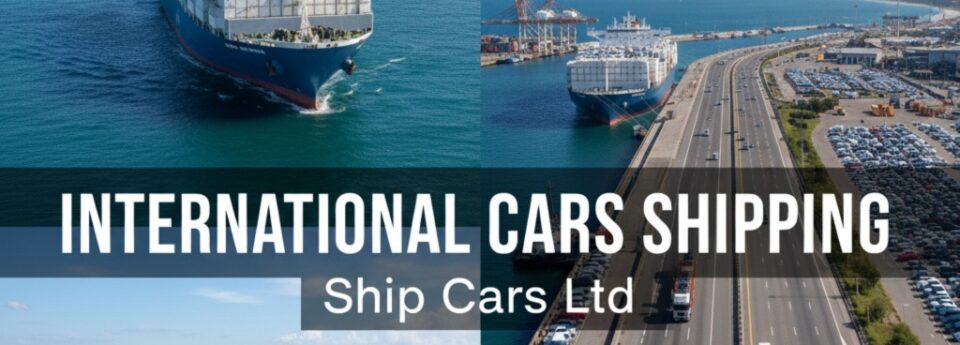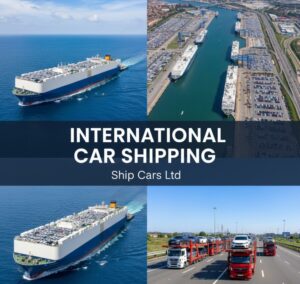
Avoiding Common Pitfalls in International Car Shipping
Shipping your vehicle overseas is a complex process, and it’s easy to overlook crucial details. To ensure a smooth and successful journey for your car, it’s vital to be aware of the common mistakes people make and how to avoid them. Ship Cars Ltd
- Not Researching Shipping Companies Thoroughly
One of the most significant errors is failing to conduct adequate research into the shipping companies you consider. A rushed decision can lead to unexpected problems, hidden fees, and potential damage to your vehicle.
Why Thorough Research is Essential:
- Reputation and Reliability: Look for companies with a proven track record, positive customer reviews, and testimonials. Independent review sites can offer valuable insights.
- Experience: Companies with specific experience in shipping to your destination country are invaluable. They’ll be familiar with local regulations and logistical nuances.
- Transparency: Reputable companies provide clear, itemised quotes without hidden charges. Be wary of unusually low prices or vague cost breakdowns.
- Customer Service: Responsive and helpful communication before, during, and after shipping is crucial.
- Services Offered: Ensure the company offers the exact service you need, from collection to customs clearance. car shipping services
How to Research Effectively:
- Compare Quotes: Obtain detailed quotes from at least three different companies.
- Check Online Reviews: Use platforms like Google Reviews, Trustpilot, or industry-specific forums.
- Ask for References: Legitimate companies should be able to provide references.
- Verify Contact Information: Ensure they have a physical address and verifiable contact details.
- Choosing the Wrong Shipping Method
Selecting the appropriate shipping method (RoRo or Container) is critical and depends on several factors related to your vehicle and needs.
Key Considerations:
- Vehicle Condition:
- RoRo (Roll-on/Roll-off): Best for operational vehicles. No personal items are permitted inside.
- Container Shipping: Suitable for non-working vehicles and allows for the transport of personal belongings (in dedicated containers only).
- Budget: RoRo is typically more cost-effective than container shipping.
- Protection: Container shipping offers superior protection from weather and potential damage.
- Vehicle Type: Hybrid and electric vehicles cannot be shipped via RoRo and require container transport.
Making the Right Choice:
- Assess your vehicle: Is it running? What type is it?
- Define your needs: Do you need to ship items with the car? What is your budget?
- Consult experts: Discuss your requirements with experienced shipping agents to get tailored advice.
- Failing to Understand Shipping Costs
Underestimating the total cost of shipping is a common oversight. International car shipping involves more than just the base freight charge.
For more details do read Preparing Your Car for Shipping.
What Contributes to the Total Cost:
- Freight Charges: The primary cost of transporting the vehicle by sea.
- Port Fees: Charges at both the UK and destination ports for handling, berthing, and administration.
- Documentation Fees: Costs for preparing and processing shipping documents.
- Insurance: Premiums for cargo insurance.
- Customs Duties and Taxes: Levied by the destination country, these can be significant and vary greatly.
- Inspection Fees: Mandatory inspections required by some destination countries.
- Clearing Agent Fees: Costs for a local agent to handle customs clearance at the destination.
- Collection and Delivery: If you use a service to pick up or deliver your car.
- Surcharges: Such as hazard surcharges for electric vehicles.
How to Avoid Cost Surprises:
- Request Detailed Quotes: Ensure quotes itemise all potential charges.
- Factor in Destination Costs: Research import duties, taxes, and local fees for your destination country.
- Be Wary of Low Prices: Exceptionally cheap quotes may indicate hidden costs or lower service standards.
- Not Insuring the Vehicle
Opting out of or underinsuring your vehicle is a significant financial risk. While shipping companies take precautions, unforeseen events can occur.
Understanding Insurance Options:
- Total Loss Cover: Protects against the vehicle being completely lost due to events like fire or sinking.
- Comprehensive Cover: Offers broader protection, including cosmetic damage, though it typically has stricter eligibility criteria (e.g., vehicle age) and may require a pre-shipment condition report. Commercial Shipping
Why Insurance is Crucial:
- Financial Protection: Covers the value of your vehicle and shipping costs in case of loss or damage.
- Peace of Mind: Knowing your investment is protected during transit.
Recommendation: Always opt for adequate insurance coverage that matches your vehicle’s value and your risk tolerance. Understand the policy’s terms, conditions, and exclusions.
- Ignoring Customs Regulations

Customs regulations vary dramatically between countries and are often complex and strictly enforced. Ignoring them can lead to severe consequences.
Potential Consequences of Ignoring Regulations:
- Seizure of the Vehicle: Your car could be impounded by customs authorities.
- Heavy Fines: Substantial penalties can be imposed for non-compliance.
- Delays: Navigating customs issues can cause significant and costly delays.
- Rejection of Import: You might be forced to ship the vehicle back to its origin.
How to Comply:
- Research Destination Regulations: Understand what is allowed, what is restricted, and what documentation is required.
- Declare All Items: Be honest and thorough when declaring the vehicle and any contents.
- Work with a Clearing Agent: A local customs broker at your destination can provide expert guidance and handle the clearance process.
- Not Understanding Destination Country Regulations
This is closely related to customs regulations but encompasses broader import rules, including vehicle age, emissions standards, and specific permit requirements.
Key Areas to Investigate:
- Vehicle Age Restrictions: Many countries have strict limits on the age of imported vehicles.
- Emissions Standards: Some nations require vehicles to meet certain environmental standards.
- Roadworthiness Requirements: A certificate of roadworthiness may be mandatory for permanent imports.
- Transfer of Residence (ToR) Rules: If you’re relocating, understand the criteria for duty exemptions on imported vehicles.
- Permits and Licenses: Certain vehicles or import types may require specific permits.
How to Stay Informed:
- Consult Official Sources: Check the websites of the destination country’s customs authority or relevant government departments.
- Engage a Local Agent: A reputable clearing agent in the destination country is your best resource for accurate, up-to-date information.
- Not Preparing the Car Properly
Insufficient preparation of the vehicle itself can lead to damage, operational issues, or rejection at the destination.
Essential Preparation Steps:
- Thorough Cleaning: Clean the interior and exterior to prevent mould, corrosion, and issues with customs or quarantine. Remove all personal belongings.
- Fluid Checks: Ensure all fluids are at the correct level and address any leaks.
- Battery Maintenance: The battery may be disconnected or drained; ensure it’s in good condition.
- Fuel Level: Keep the fuel tank nearly empty for safety.
- Mechanical Check: Ensure the vehicle is operational if using RoRo. For container shipping, confirm it can be loaded (or arrange for winching).
- Overlooking Shipping Timeframes
Underestimating the total transit time, including potential delays, can disrupt relocation plans or business timelines.
Factors Affecting Shipping Time:
- Shipping Method: RoRo and container services have different schedules.
- Route and Port Congestion: Vessel routes, port efficiency, and potential delays at ports.
- Customs Clearance: Processing times at both origin and destination.
- Weather: Adverse weather can impact sailing schedules.
How to Manage Timeframes:
- Get Realistic Estimates: Ask your shipping company for estimated transit times but be aware these are not guarantees.
- Factor in Buffer Time: Always allow for potential delays in your planning.
- Track Your Shipment: Utilize tracking services to monitor progress.
- Booking the Different Service Level
Mistakes in selecting the correct service level (e.g., shared container vs. dedicated container, express vs. standard RoRo) can lead to dissatisfaction, higher costs, or unmet needs.
Understanding Service Levels:
- RoRo vs. Container: As discussed, this is the primary choice based on vehicle condition and need to ship items.
- Dedicated Container: Offers maximum security and the ability to car shipping belongings, but is more expensive.
- Shared Container: A more economical container option, but may have less flexibility for personal items and longer loading/unloading times.
Choosing Wisely:
- Align with Needs: Match the service level to your vehicle’s condition, budget, and whether you need to ship personal items.
- Clarify Inclusions: Understand exactly what each service level entails.
- Not Tracking the Shipment
Failing to track your shipment leaves you in the dark about its progress and potential issues.
Benefits of Tracking:
- Awareness: Know where your vehicle is in transit.
- Proactive Planning: Anticipate arrival times and make arrangements for collection.
- Early Issue Detection: Identify potential delays or problems sooner.
How to Track:
- Shipping Company’s Tracking System: Most companies provide online tracking tools.
- Bill of Lading Number: You’ll typically need this reference number to track your shipment.
- Regular Communication: Stay in touch with your shipping agent for updates.
By being mindful of these common mistakes and taking proactive steps to avoid them, you can significantly improve the likelihood of a successful and stress-free international car shipping experience







